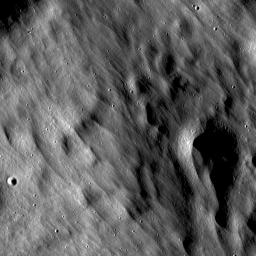
|
Delicate Patterns in Giordano Bruno Ejecta
- Click the image above for a larger view
- Full-Res JPEG (1250 x 1250) (244.2 kB)
- Full-Res TIFF (1250 x 1250) (1.6 MB)
Caption:
Far edge of the Giordano Bruno crater ejecta blanket. LROC NAC M115617436L, 0.9 meters/pixel (3 feet/pixel), image width is 1.08 kilometer (3543 feet), Sun is from right side. Giordano Bruno is to the northwest of image.
Impact cratering is a common and universal phenomena on every planet and satellite. However, we still do not completely understand this complicated process. The Moon is one of the best libraries of impact craters in our Solar System because its surface is not modified by atmospheric weathering or water erosion. The dominant form of erosion on the Moon is indeed impact cratering.
Background Info:
NASA's Goddard Space Flight Center built and manages the mission for the Exploration Systems Mission Directorate at NASA Headquarters in Washington. The Lunar Reconnaissance Orbiter Camera was designed to acquire data for landing site certification and to conduct polar illumination studies and global mapping. Operated by Arizona State University, LROC consists of a pair of narrow-angle cameras (NAC) and a single wide-angle camera (WAC). The mission is expected to return over 70 terabytes of image data.
Cataloging Keywords:
| Name | Value | Additional Values |
|---|---|---|
| Target | Moon | |
| System | Earth | |
| Target Type | Satellite | |
| Mission | Lunar Reconnaissance Orbiter (LRO) | |
| Instrument Host | Lunar Reconnaissance Orbiter | |
| Host Type | Orbiter | |
| Instrument | Lunar Reconnaissance Orbiter Camera (NAC) | |
| Detector | Narrow Angle Camera (NAC), Wide Angle Camera (WAC) | |
| Extra Keywords | Atmosphere, Crater, Grayscale, Impact, Water | |
| Acquisition Date | ||
| Release Date | 2010-11-22 | |
| Date in Caption | ||
| Image Credit | NASA/GSFC/Arizona State University | |
| Source | photojournal.jpl.nasa.gov/catalog/PIA13685 | |
| Identifier | PIA13685 | |
